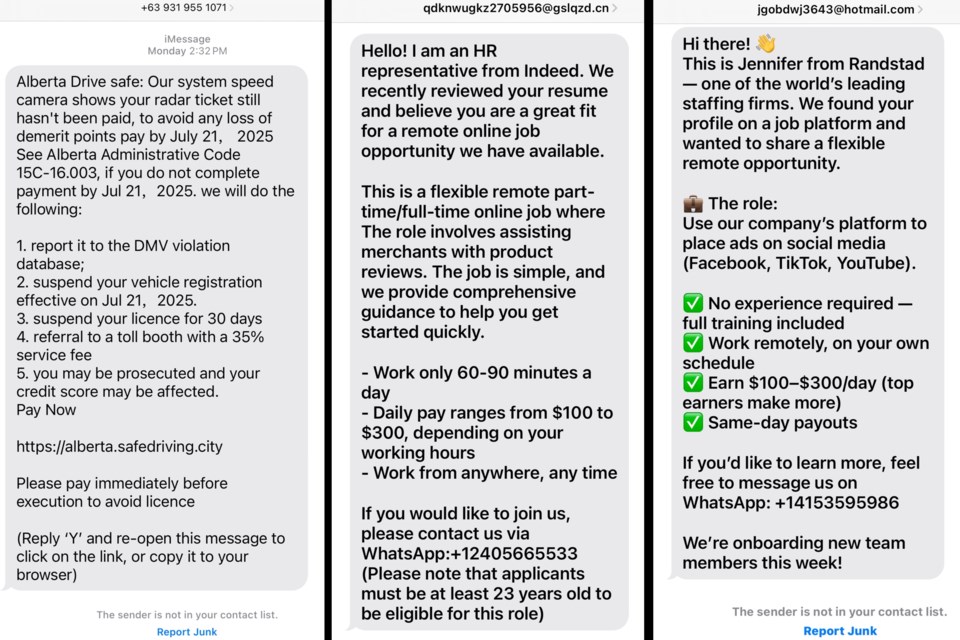SUNDRE – Since the advent of internet and email, scammers have by presenting themselves as legitimate agencies or authorities unscrupulously endeavoured to dupe unwitting individuals either into sending money or divulging sensitive data that can lead to identity theft.
While such fraudulent activity unfortunately remains prevalent, digital scams have since evolved to include text messages.
Among some of the latest incarnations are fraudsters impersonating talent scouts or HR representatives from job-seeking companies like Randstad or Indeed offering remote online work, as well as a more localized phishing scams such as people receiving a message from Alberta Safe Drive or Safe Roads Alberta claiming they have an unpaid photo radar speeding ticket.
Cpl. Courtney Harding, acting commander of the Sundre RCMP detachment, said on July 23 that the department had since the start of the month already received five reports about such activity, primarily regarding the photo radar scam.
But the corporal said even she had recently received a text offering remote work.
“It was very evident it was a scam,” said Harding, adding she promptly reported the message as junk, blocked the sender and deleted the message.
The corporal added two separate individuals had called the detachment to report they had received the Safety Drive Alberta texts. Although neither one of them fell for the scam and promptly reported then blocked the sender through their phone’s service provider and deleted the messages, they nevertheless sought to inform police, she said.
“It’s really super unfortunate that this sort of thing happens,” she said.
The corporal’s advice, first and foremost, is to never send money or click on any links included in random, unsolicited text messages.
“It’s not a typical way for any type of enforcement to be done over text; it’s just not done. We just do not do that,” she said.
“You can guarantee anything that’s received over text message is a scam.”
At the end of the day, regardless of what organization the sender claims to represent, anyone who might harbour doubts can always try to follow up with the agency through official channels such as by phone to verify its legitimacy, she said, adding such instances can also be brought to the RCMP’s attention.
“There’s no harm in contacting us to report this,” she said.
“We can kind of try to track any trends and make sure we get that information out for educational purposes and prevention.”
Companies will once contacted also more likely than not quickly confirm the fraudulent nature of such solicitations, she said.
“Typically, once those companies become aware of fraudulent activity on their behalf, they’re really quick to put notices up on their websites or send out emails to their clients or whatever the case is, just to advise this is what they’ve become aware of and that it is in fact a scam.”
The website for Indeed, a global job search and recruitment platform, has done exactly that.
“Getting a job offer through a text message or phone call can be exciting, but be careful. It might be a scam,” reads part of the website’s section on fraud.
“Indeed will never ask job seekers for payment through WhatsApp, Telegram, or phone calls,” it states.
“Be cautious of unsolicited messages from people pretending to be recruiters or claiming to be from Indeed.”
Among glaring red flags are receiving job offers without having applied for the position, speaking with a hiring manager or going through an interview.
Further tell-tale signs include a manufactured sense of urgency such as threats to revoke access to one’s account, resolving a technical issue within a time limit, demanding personal data or sign-in credentials, as well as clicking a link or contacting them through another communication channel.
Other giveaways are messages sent either from unrecognizable numbers or even emails that are composed of seemingly random sequences of letters and numbers.
Additional similar scams include messages claiming a package has been held up by a local postal service that can be resolved by clicking on a link, impersonating tax agencies demanding immediate payment, and posing as tech support for an urgent fix to a device.
Despite all the variations, the intent is generally the same – to steal personal information, which can include identity, financial data, sign-in credentials, or even access to digital devices.
Anyone who receives what they suspect to be a fraudulent message is advised not to contact the scammer and block their number after reporting it as junk.



